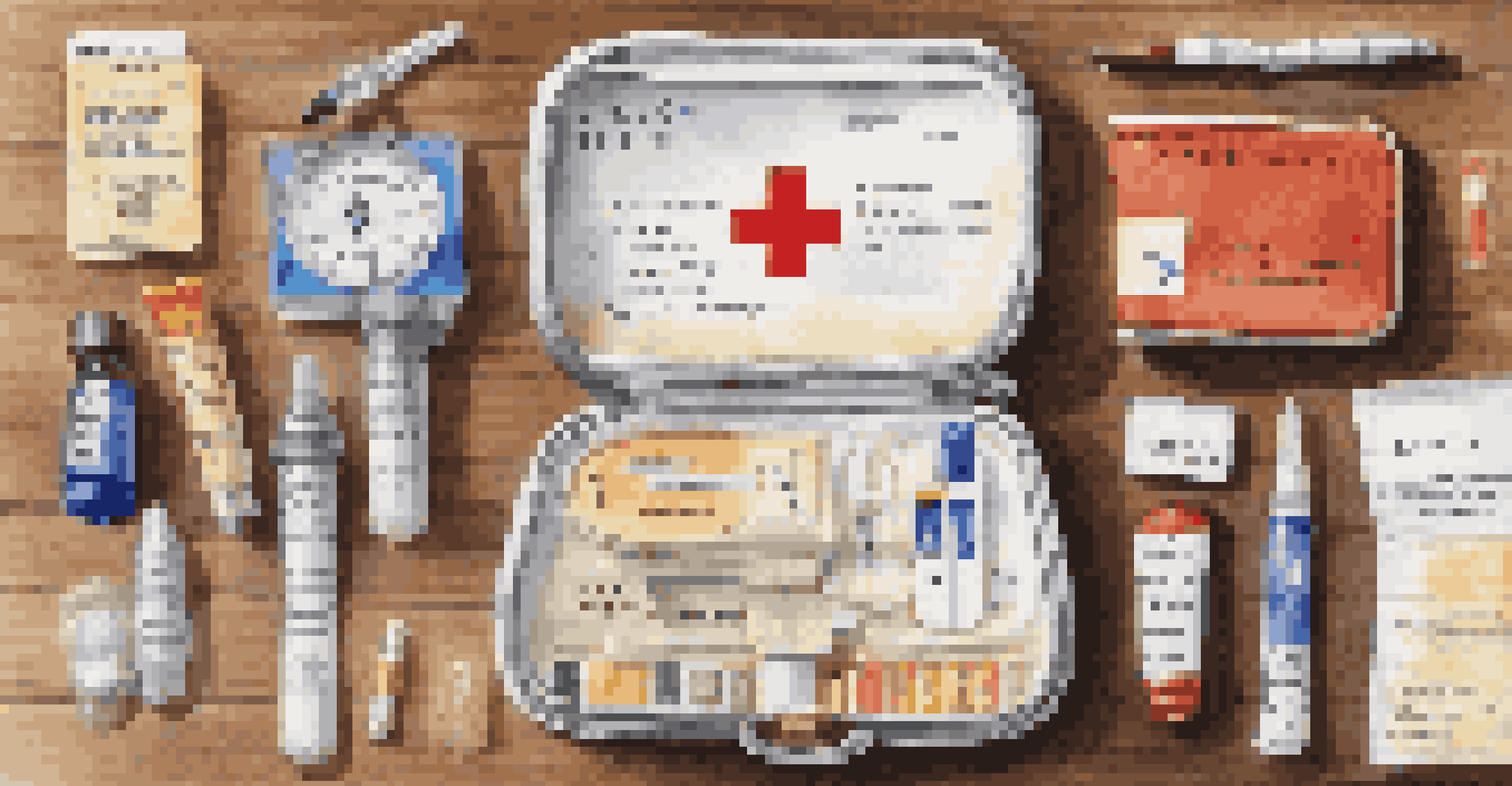How to Deal with Allergic Reactions While Traveling Abroad

Understanding Allergic Reactions During Travel
Allergic reactions can strike unexpectedly, especially in unfamiliar places. Whether it's a reaction to food, pollen, or insect stings, being aware of your allergens is crucial. Understanding how your body reacts can help you prepare for potential triggers while traveling.
Traveling is about the gorgeous feeling of teetering in the unknown.
Traveling abroad can expose you to new environments and allergens that you might not encounter at home. For instance, different foods or even climate changes can lead to allergic responses. Knowing the common allergens in your destination can help you avoid unnecessary discomfort.
Keep in mind that symptoms can vary from mild to severe. Recognizing the signs early can make a significant difference in how quickly you respond to an allergic reaction, ensuring you stay safe and enjoy your trip.
Preparing for Your Trip: Essential Steps
Preparation is key when traveling with allergies. Before you leave, consult with your doctor to discuss your specific allergies and obtain necessary medications. Having a plan in place can alleviate anxiety and allow you to focus on enjoying your adventure.

Create a travel health kit that includes your medications, such as antihistamines and an epinephrine auto-injector if prescribed. Make sure to pack these in your carry-on bag for easy access. Don't forget to include any allergy information in your kit, like your allergy list and emergency contacts.
Know Your Allergens Before Traveling
Being aware of your specific allergens and how they may be triggered in new environments is crucial for a safe trip.
Research your destination's healthcare facilities beforehand. Knowing where to go for help in case of an emergency can provide peace of mind. This preparation empowers you to tackle allergic reactions confidently while traveling.
Communicating Your Allergies Abroad
Clear communication is essential when dining or interacting in a foreign country. Learn simple phrases related to your allergies in the local language. This can help you effectively communicate your needs to restaurant staff or locals.
The journey of a thousand miles begins with one step.
For example, if you're allergic to nuts, knowing how to say, 'I cannot eat nuts' in the local language can prevent misunderstandings. You can also carry translation cards that outline your allergies in the local language, which can be especially useful in restaurants.
Don't hesitate to ask questions about ingredients and food preparation methods. Many places are willing to accommodate allergies, but it's important to be proactive in ensuring your safety.
Identifying Safe Foods While Traveling
Navigating food options in a new country can be challenging, especially for those with allergies. Stick to simple, whole foods that are less likely to contain hidden allergens. Fruits, vegetables, and unprocessed meats are often safer choices.
When trying new dishes, be cautious with sauces and dressings, as they can contain allergens. Always ask for ingredient lists or opt for meals that you can customize to your dietary restrictions. This way, you can enjoy the local cuisine without compromising your health.
Prepare an Allergy Travel Kit
Packing necessary medications and having an emergency plan ensures you're ready to handle allergic reactions on the go.
Additionally, familiarize yourself with local cuisine and common allergens present in traditional dishes. This knowledge will help you make informed choices and enhance your travel experience.
Staying Alert to Allergens in the Environment
Environmental allergens can vary greatly from one location to another. Pollen, dust, and mold levels may be higher in certain areas, which can trigger reactions in sensitive individuals. It's wise to research the pollen counts and climate conditions of your destination.
When exploring outdoor attractions, consider wearing sunglasses and a mask to minimize exposure to pollen and allergens. These simple accessories can make a significant difference in how you feel while enjoying nature.
If you're prone to insect stings, be cautious in outdoor settings. Wearing protective clothing and using insect repellent can help reduce the risk of allergic reactions from bites or stings.
Emergency Plans: What to Do if You React
Even with careful planning, allergic reactions can still occur. Having an emergency plan in place is vital for your safety. Ensure that you know how to use your medications, especially an epinephrine auto-injector, and when to administer them.
Identify local emergency numbers and the nearest hospital or clinic. Familiarizing yourself with the healthcare system in the country you're visiting will help you act quickly if an emergency arises. Keep a list of these contacts handy in your travel kit.
Communicate Allergies Clearly Abroad
Learning key phrases in the local language and asking about ingredients can help you navigate food safety while traveling.
Tell your travel companions about your allergies and your emergency plan. This way, they can assist you in case of an allergic reaction, ensuring you're never alone in a challenging situation.
Post-Travel: Reflecting on Your Experience
After your trip, take some time to reflect on your experiences dealing with allergies abroad. Consider what strategies worked well and what could be improved for future travels. This reflection can help you become an even more confident traveler.
Share your experiences with fellow travelers, especially those with similar allergies. Your insights could help others prepare for their own adventures, creating a supportive community of travelers who prioritize safety.

Lastly, keep updating your travel health kit and allergy information based on your experiences. Staying proactive will ensure that you're always ready for your next journey.